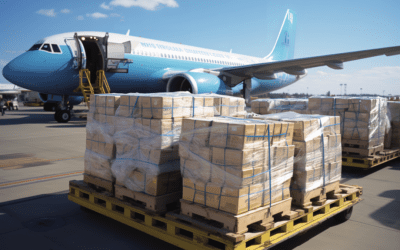As the temperatures rise and hurricane season starts, supply chain professionals face unique challenges that impact the smooth flow of goods and services. Being mindful of summer season supply chain disruptions is a safe way to stay informed. Not only are there environmental risks for supply chains, but behavioral patterns can also have a significant impact
Article Overview
Transportation disruptions should be a top priority for supply chain professionals, especially during high-volume seasons when traveling increases. With more drivers on the road, it can cause shipment delays, resulting in production and overall operation inefficiencies.
Overcoming these hurdles and keeping your supply chain running smoothly requires comprehensive knowledge. Developing a plan with suppliers and customers to improve communication can minimize supply chain interruptions. So, buckle up and uncover valuable tips and strategies for keeping those deliveries on track during the summer.
Environmental Disruptions
Supply chains can face significant challenges due to environmental factors and are often challenged by disruptions. Amidst heat waves, wildfires, and other challenges, supply chains can ensure seamless operations and minimize risks by implementing proactive strategies.
- Hurricanes
June 1st is the official start of hurricane season, and forecasters are predicting an average year for hurricanes. However, even in an average year, storms can cause disruptions in operations. Hurricanes can easily damage infrastructure to roads and warehouses, leading to extended delays and potential supply chain constraints.
- Heat Waves
Increased temperatures are another factor to consider during the summer. Heat waves impact certain products’ quality and shelf life, such as perishable goods and pharmaceuticals. Heat waves are expected to increase this year and could exceed previous record years.
Researchers have identified Afghanistan, Papua New Guinea, and Central America as hot spots for high-risk heat waves, but even if you’re not located in these regions, it’s important to account for the impact of high temperatures.
- Fires
Wildfire outbreaks are a definite concern during warmer months for supply chain professionals. The past five years have had three of the largest, record-breaking wildfires. Extreme wildfire conditions pose a risk of shortages across various industry sectors, including technology, agriculture, and healthcare.

Weather Patterns
The weather significantly impacts transportation and operations, leading to supply chain disruptions in air, sea, and land travel. Unpredictable weather conditions can result in road closures, delays in air cargo shipments, and compromise the quality of goods during transportation.
Staying informed on weather forecasts, implementing preventative measures, and establishing plans and strategies enables truckers and supply chain managers to minimize disruptions and ensure a seamless process that can withstand weather conditions.
Behavior Trends
Although weather conditions cause some seasonal challenges in transportation, it is crucial to recognize that behavior trends can also contribute to disruptions. Increased travel and vacations can lead to shipping delays, and higher demands for certain goods will also impact supply chains. Anticipating and planning seasonal behavior trends will ensure smoother operations and timely deliveries.
- Increased Traffic
Increased traffic in the warmer months is a huge obstacle for those delivering products on land. July is the busiest travel month as vacation travelers pack up for personal trips and getaways, and traffic may pose a significant obstacle for products being shipped on land
- Port Interruptions
Ports are a critical component for global trade – however, inclement weather and system shutdowns can negatively impact goods from being shipped. Port delays during the summer months present significant challenges, disrupting supply chains and causing various issues such as increased cost, reduced productivity, and customer dissatisfaction.
- Air Cargo Delays
Several things can cause delays in air cargo, including staffing and resource challenges that directly impact processing times. Economic fluctuations can also pose a threat to the industry, affecting demand and overall capacity. Furthermore, increased travel is another factor and can limit space availability on an aircraft, resulting in shipping delays.
Mitigating Supply Chain Interruptions
As the summer approaches, supply chains must prepare for potential disruptions caused by behavior trends, weather patterns, and shipping delays. Businesses should prepare appropriately by implementing strategies to remain proactive and responsive to market conditions.
- Developing Strategic Plans
Developing plans for supply chain interruptions is essential during hurricane seasons. This could look like conducting a risk assessment to identify potential vulnerabilities and evaluating location conditions, transportation routes, and supplier dependencies to better prepare and understand areas with higher risks.
- Increase Communication and Collaboration
To effectively mitigate disruptions, it’s important to establish and maintain clear communication with suppliers. Clear and concise communication ensures that important information is shared promptly and effectively with everyone. Allowing for improved collaboration can minimize the negative impacts and ensure the safety of everyone involved.
- Risk Management
Risk management is essential for maintaining a responsive supply chain. By engaging in proactive risk management strategies, businesses can identify potential risks. Leveraging resources such as technology solutions and diverse transportation routes, and conducting risk assessments, businesses can proactively mitigate the risk of disruptions during the summer seasons.
Stay Ahead, Stay Resilient
Supply chain interruptions are inevitable, especially during the summer months. Industry professionals must develop plans to mitigate potential disruptions. Increased communication and collaboration help maintain a responsive and resilient supply chain. The bottom line is to be mindful of interruptions during the summer and ensure a smooth flow of goods to maintain customer satisfaction.
Looking for other seasonal impacts? Check out Holiday Season Effects on the Supply Chain – KCH Transportation






